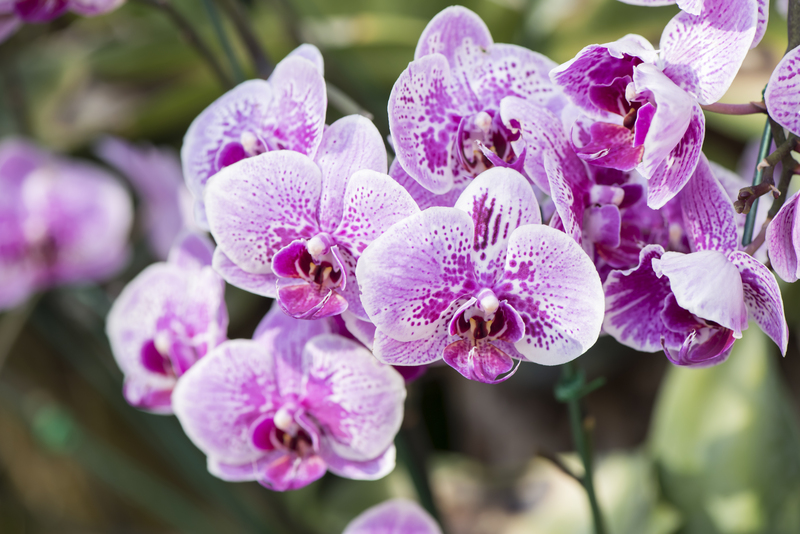Discover Zen Garden Elements for a Tranquil Atmosphere
Posted on 26/08/2025
Discover Zen Garden Elements for a Tranquil Atmosphere
Are you searching for effective ways to transform your outdoor or indoor space into a calming sanctuary? Zen gardens--also known as Japanese rock gardens--offer a timeless philosophy and meticulously chosen design features that create a sense of peace, contemplation, and balance. Whether you have a sprawling backyard or a small balcony, integrating Zen garden elements can help you cultivate a tranquil atmosphere that nourishes both mind and body. In this comprehensive guide, discover the essential components, ideas, and practical tips for incorporating a variety of Zen garden features to create your own oasis of serenity.
What Is a Zen Garden?
A Zen garden--often called karesansui or "dry landscape" garden--is a minimalist landscape commonly associated with Japanese monasteries. These gardens are designed for meditation, reflection, and fostering inner peace. Rather than relying on lush greenery, Zen gardens use stones, gravel, sand, carefully pruned plants, and water elements to craft symbolic landscapes. Each element holds spiritual or philosophical significance, inviting observers to meditate and connect with nature's simplicity.

Essential Zen Garden Elements for a Tranquil Atmosphere
To achieve an authentic and soothing space, it's important to select the right Zen garden elements. Here are the fundamental features you should consider integrating:
1. Gravel and Sand: The Canvas of Calm
- Raked gravel or sand is the quintessential feature of every Zen garden. It represents water, with ripple patterns suggesting the gentle movement of waves or streams.
- *Use a rake or comb to create swirling or straight lines--an act often used as a meditative practice in itself.*
- Choose fine white gravel or pale beige sand for a classic look, or try black sand for dramatic contrast.
Tip: Raking the sand daily will not only keep the garden tidy but also help clear your mind, contributing to a tranquil atmosphere.
2. Rocks and Stones: Symbols of Strength and Stillness
- Rocks represent mountains or islands and serve as focal points in your Zen garden design.
- Use stones of varying shapes and sizes--upright stones for vertical energy, flat stones for stability, or sloping stones for movement.
- Arrange rocks in odd-numbered groupings (such as 3, 5, or 7) to create visual harmony, as even numbers are traditionally seen as unnatural.
- *Weathered or moss-covered rocks enhance the aged, tranquil feeling common in Japanese gardens.*
3. Water Features: Serenity in Motion
- Although classic Zen gardens are dry, the inclusion of a modest water feature--like a small pond, bamboo fountain, or water basin--can add sensory depth and amplify tranquility.
- *The sound of trickling water creates a soothing ambiance, ideal for reducing stress and inviting mindfulness.*
- Tip: Incorporate a "tsukubai" stone basin to introduce water without overwhelming the minimalist theme.
4. Greenery and Plants: Living Art
- Zen gardens use plants sparingly, focusing on evergreens, mosses, and low-maintenance shrubs to reinforce a feeling of serenity.
- Popular choices: bamboo, Japanese maple, azalea, ferns, and juniper.
- Moss carpets and groundcovers soften stone elements and evoke the sense of stillness found in ancient forests.
- Keep pruning precise--shape shrubs and trees to reflect the beauty of nature, not rigid geometry.
5. Paths and Stepping Stones: Mindful Movement
- Winding paths, often made from natural stone or cut slabs, encourage slow, meditative walking and contemplation.
- Irregular placement of stepping stones encourages mindfulness and careful pacing, keeping visitors anchored in the present moment.
- *Paths can also symbolize life's journey, reinforcing the garden's reflective purpose.*
6. Bridges: Transition and Connection
- Small wooden or stone bridges, whether they cross a dry river of gravel or a pond, represent passage and transformation.
- Bridges add visual interest and symbolize the journey from the mundane to the sacred.
7. Decorative Ornaments and Accents
- Lanterns, pagodas, and bamboo fences serve as ornamental touches that evoke the spirit of traditional Japanese gardens.
- *Opt for stone or weathered wood for authenticity, and place ornaments asymmetrically to reflect natural randomness.*
- Avoid overcrowding your space with too many decorations--Zen design is rooted in simplicity.
How to Arrange Zen Garden Features for Optimum Tranquility
Now that you've explored individual Zen garden features, the next step is learning how to blend them into a harmonious composition.
Balance and Asymmetry
- The principle of "wabi-sabi" values imperfection, randomness, and unforced beauty, so avoid perfectly symmetrical designs.
- Place large rocks off-center, vary plant heights, and provide empty spaces to invite contemplation.
Layers and Perspective
- Layering elements--such as rocks, gravel, moss, and plants--creates depth and a feeling of natural progression.
- Use foreground and background features to guide the eye gently through the space.
Creating Zones of Interest
- Separate areas for meditation, walking, or simply observing the garden.
- Screen some features with bamboo or evergreens to nurture a sense of intimacy and seclusion.
Easy Zen Garden Ideas for Any Space
You don't need a massive yard or endless resources to benefit from Zen garden tranquility. Here are some accessible ideas:
- Tabletop Zen Gardens: Create a miniature version with a small tray, a handful of sand, tiny rocks, and a rake. Place it on your desk to encourage mindful breaks throughout the day.
- Corner Zen Retreat: Transform a shaded garden corner with gravel, a cluster of rocks, a small water basin, and some moss or shade-loving ferns.
- Balcony Zen Space: Use containers filled with sand, decorative stones, and a few potted bamboos to bring tranquility to your apartment balcony.
- Indoor Zen Nook: Position a shallow sand tray near a window, add a small fountain, and arrange a few sculpted evergreens or succulents for a restful home-area sanctuary.
No matter your space, the underlying principles of Zen garden elements remain: simplicity, balance, symbolism, and a focus on tranquility.
The Spiritual and Mental Health Benefits of Zen Gardens
Beyond aesthetic appeal, incorporating Zen garden features into your environment can yield profound mental and spiritual benefits:
- Stress Reduction: The simple act of raking or observing patterns in gravel has a proven calming effect, lowering heart rate and soothing anxiety.
- Enhanced Mindfulness: The invitation to pause, breathe, and focus on natural forms helps sharpen presence and awareness, key tenets of mindful living.
- Promotes Creative Thinking: The open, uncluttered design sparks imagination, fostering clarity and problem-solving skills.
- Encourages Meditation and Contemplation: Zen gardens provide the perfect environment for cultivating inner stillness, self-reflection, and spiritual growth.
Tips for Maintaining Zen Garden Peace
- Regular Raking: Smooth gravel, redefine patterns, and clear debris to preserve the garden's crisp, peaceful look.
- Weed and Moss Control: Keep moss healthy but remove encroaching weeds or invasive plants to maintain harmony.
- Prune Thoughtfully: Shape trees and shrubs with care, echoing natural forms and avoiding over trimming.
- Seasonal Refresh: Adjust plantings and tidy structures at the start of each season to continue fostering tranquility.

Frequently Asked Questions about Zen Garden Design
Can I personalize my Zen garden?
Absolutely! While traditional Zen gardens have specific design guidelines, your version should reflect your personal sense of peace. Add elements that speak to you, but remember to maintain simplicity and avoid clutter.
Is a Zen garden expensive to create?
Not necessarily. Many elements--like rocks, gravel, and sand--are affordable and widely available. Tabletop Zen gardens or small outdoor corners can be created on a modest budget.
Do Zen gardens require a lot of maintenance?
Zen gardens are generally low maintenance, especially compared to traditional Western gardens. However, regular raking and occasional pruning are key to preserving the intended atmosphere of tranquility.
Conclusion: Embrace Zen Garden Elements for Lasting Tranquility
Integrating Zen garden elements for a tranquil atmosphere allows anyone to foster a space of harmony, beauty, and inner calm. Whether outdoors or indoors, blending simple materials with intentional design will inspire mindfulness, relaxation, and a deeper connection to nature. Begin today by selecting just one or two features--perhaps some smooth river stones or a small sand tray--and let your journey toward serenity unfold.
Ready to create your own peaceful haven? Explore the subtle power of Zen garden design and transform your space into a sanctuary of tranquility and renewed spirit.
Latest Posts
Garden Design Tips for Dog Lovers and Green Thumbs
Artistic Expressions with Custom Hedge Trimming Styles
Comprehensive Orchid Care for Beginners

